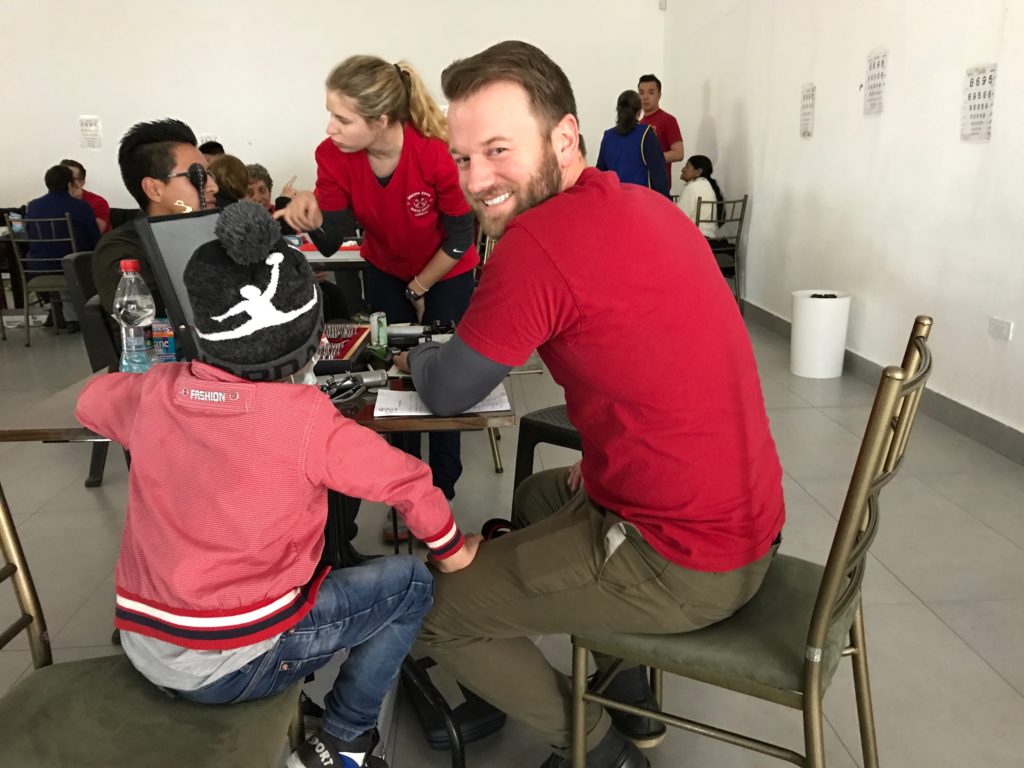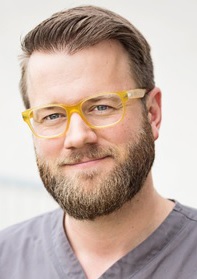
Dr. Packer working with a child in need of eyecare on his latest VOSH mission trip to Ecuador.
By Casey Packer, OD
August 30, 2017
I did something this summer that is among the most gratifying experiences: I participated in a medical mission that brought eyecare to people who never had an eye exam or vision screening before.
Participating in medical missions builds your skills as an optometrist, and it also keeps you engaged in the profession, providing a powerful reminder of why you became an OD in the first place. It also can help you build your practice as patients learn of your charitable works, and want to be part of a practice owned by a doctor who seeks to do good.
Never Too Soon to Start
My first medical mission was just after graduating from optometry school seven years ago.
There is about a three-month lag period between passing your final boards and graduating. Instead of just sitting around, I decided to go on my first medical mission trip to Ecuador. I have since been back four times, including my trip this summer.
After my trip I realized how much of an impact I could make on people with the skill set I have. I pledged at that moment that once my practice was in a comfortable position, I would participate in a trip every year to help those less fortunate than myself. We are extremely lucky to be able to improve people’s lives everyday as part of our job, and being a part of these missions reminds me of that.
This year I sponsored three young optometrists, who had worked in my office during their undergraduate years as externs, to fly down and help with the trip. Hopefully they, too, will continue to provide their services on trips like these in the future.
Costs Can Be Kept Low
The cost of a plane ticket, hotel room and food is the only fee on the missions I’ve participated in. The VOSH group that I traveled with, (Voluntarios de Santa Cruz, Canada), finds low-cost options on lodging, and we usually don’t incur a charge of more than $50 a night for hotel rooms. The plane ticket to Ecuador was $500 round trip. The equipment needed for the trip are things we already purchase during optometry school, and the rest of the equipment is brought by Voluntarios de Santa Cruz, or whichever group you travel with. You can go on trips for as short as a few days, but I usually prefer to invest 10-14 days.
Provide Much-Needed Care
We treat infections and surface disease on our missions to Ecuador. We perform refractions and dispense glasses on the spot. The glasses aren’t custom-made for the patient; we just travel with a huge inventory of glasses that are organized and labeled by prescription. It’s the job of the volunteers to find the glasses that most closely match the prescription. There are usually 15-20 second-year optometry students from the two colleges of optometry in Canada that participate in the trip. They are helpful, and the doctors end up training and teaching the students a lot during the mission. I love helping the younger doctors develop their skills.
I have a video of a young girl with disabilities, who we provided with her first pair of glasses. Her reaction is priceless. She is five, and couldn’t see better than 20/60 before getting glasses. I had a 54-year-old man this year who had been legally blind his whole life, and I found that he just had a -10.00 Rx in both eyes. We gave him glasses, and he couldn’t even respond because he was so shocked by the way his world visually had changed. It was an amazing gift. Here is the video of the young girl we were able to help:
Let Patients Know What You Do & Ask Them to Help
We send out an e-mail blast after the trip each year with a short 3-5 sentence breakdown of the trip and pictures. We have tons of patients respond to this. They comment at their next exam about how excited they were to see that I participated in charitable missions, and some have even donated to the VOSH group that I usually travel with.
We’ve accepted old frames for donation since we’ve opened. We advertise that they support a practice that, in turn, supports healthcare for others. There’s no set percentage of revenues that I donate annually, but I sponsor other doctors to go on the trips, so that more people can be helped.
Find a Mission to Participate In
The national VOSH web site has a list of all the available missions that are coming up. That’s where I find all my trips.
Have you participated in a medical mission? What did you learn that helped you develop as a doctor? How have those skills, and the experience, helped you become more successful in your practice?
 Casey Packer, OD, is a certified optometric glaucoma specialist and therapeutic optometrist, and owner of Lone Star Eye, in Austin, Texas. To contact him: docpacker@gmail.com
Casey Packer, OD, is a certified optometric glaucoma specialist and therapeutic optometrist, and owner of Lone Star Eye, in Austin, Texas. To contact him: docpacker@gmail.com

























